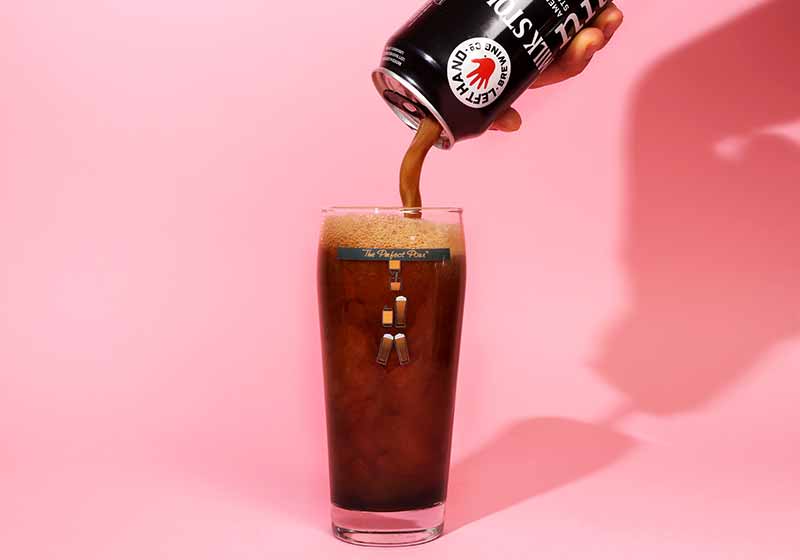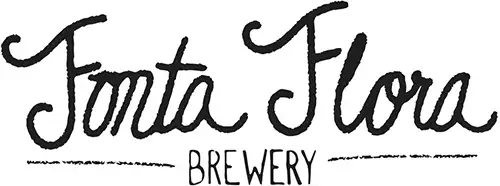
We’ve highlighted many ways to take a stout, such as an imperial stout, pastry stout, or tried-and-true dry Irish stout, and elevate it, whether using chocolate, lactose, or oats. Could moving away from CO2 and making a nitro beer further elevate these beers?
We talked with experts in nitro beer—a style that provides a new experience for consumers, as well as mimics old-world hand-pulled beer—from Chart Industries, Joy Can Solutions, Left Hand Brewing, and Roaring Table Brewing to learn what the market is for nitro beer, the future of the style, and which ways to incorporate it best.
Affordable, Industry-Leading Brewery Software
What Exactly Is the History of Nitro Beer?

Photography courtesy of Guinness
Nitro beer isn’t a new trend. It has been around for quite some time—though modern technology has provided new ways of dosing beer with nitrogen.
“The start of it began with cask beer in the U.K., where you would have natural carbonation, before standard carbonation,” Joy Can Solutions Founder James Cain says.
Cain explains how cellarmen would manage the carbonation in the cask by adding yeast and sugar, but that was inconsistent.
“Guinness was looking at having more standardization of their beers in the market,” Cain says. “Guinness wanted more control, so they began leveraging nitrogen—which pre-dates forced carbonation in beer—to control the carbonation in beer. They would force-nitrogenate their kegs. That all started with them.”
Cain adds, “Given that nitrogen represents a high amount of earth’s atmosphere, it gives the similar [feel] as cask-pumped beer.”
Nitro beers are nitrogenated either before packaging in pressure-sealed kegs or in-line on the way to a draft system, according to a Hop Culture piece.
Tap handles devoted to nitro beer have a restrictor plate, which forces beer through tiny holes, allowing the dissolved nitrogen gas to escape and leading to a cascading effect in the glass.
Coming from a cold, pressurized keg into a room temperature, non-pressurized glass, the nitrogen attempts to escape. As the nitrogen rushes to the bottom of the glass, a thick, aromatic foam builds on top, and the nitrogen then escapes out the sides of the glass.
What Is the Market for Nitro Beer?

Photography courtesy of John A. Paradiso | Hop Culture
IPA is the king of craft beer, as evidenced by the latest Untappd Year in Beer data. Stouts rank number two on that list. With many stouts doubling as nitro beer, does that mean the market for the style is growing?
“The short answer is yes,” Bump Williams Consulting President and Chief Executive Officer Dave Williams says in an email.
Williams says the growth of nitro beer is related to five reasons.
“First, there [are] a lot of nitro beer offerings now out and available in the off-premise trade channels, and consumers know how darn good nitro beer tastes on draft,” Williams says. “Just in time for St. Patrick’s Day, I might add.”
Williams adds that nitro beer served in the on-premise arena has driven the style.
“And when consumers go shopping at their favorite store for beer and see a nitro beer offered by their favorite and most-trusted brewer, they buy it,” he says.
Another trend Williams sees is non-alcoholic nitro beer offerings—a rapidly growing segment with consumers.
Another thing: Although stouts seem like the most favored style for nitro, Williams says you can actually find many varieties with nitro. “And as we all know—flavors sell,” Williams says. “Lastly, nitro beers are typically offered as seasonal or special-release beer, and every beer drinker loves [those].”
Chart Industries Business Development Manager Christina Marrick says “absolutely” there is a market for nitro beer.
“So many [breweries] are trying to expand, diversify, and stand out,” Marrick says. “People are looking for something different. Nitro is very popular.”
Cain says nitro beer has been an ever-growing market since the craft beer boom.
“When the craft beer movement came along, nitro picked up steam,” Cain says. “As the market continues to grow, the [nitro] use cases are increasing.”
Roaring Table Co-Founder Lane Fearing says they recently picked up a Nitro Brew nitrogen infuser for a dedicated tap based on his feelings that the market is growing.
“I think that it’s on the upswing,” Fearing says. “It fell out of favor for some time amongst craft aficionados. Now it has a role to play with texture and experiences drinking beer.”
Left Hand Brewer Gary Glass says they have a strong following of nitro beer drinkers.
“There’s a particular audience for nitro beer,” says Glass, who adds that they are trying to make innovative beers on nitro, including launching a Belgian white beer.
“It’s completely new and gaining a lot of traction,” Glass says. “I was skeptical about the Belgian white idea, but overall, it’s a pleasant drinking experience. Definitely nitro enhances its drinkability.”
What Are Ways to Inject Nitro Into Packaged Beer?

Photography courtesy of Guinness
There are multiple ways to introduce nitro in beer. Chart Industries and Joy Can Solutions both offer liquid nitrogen dosing during can and bottle packaging.
Guinness uses a widget, which they introduced beer consumers to in 1989.
Ryan Wagner, interim marketing manager at Guinness Open Gate Brewery, says in a Hop Culture piece that the widget “is a remarkable bit of invention because of its simplicity.”
Wagner says that an empty widget goes into an empty can, and then the beer, which already has the right gasses in it, goes into that can, filling up the widget and the can simultaneously. Guinness then adds the additional pressure they need and caps the can.
This super simple yet ingenious innovation won the most important invention of the twentieth century in Ireland—just beating out the Internet—and the Queen’s Prize in the U.K. the year it was introduced.
If you’re not using a widget to nitrogenate packaged beer, liquid nitrogen is an option. Although there is a capital investment in buying liquid-dosing technology, Cain explains that breweries experience benefits beyond simply incorporating liquid nitrogen during the canning or bottling-line process. He names two: increasing internal can pressure, needed for non-carbonated products like hard teas, and extending the shelf-life of a product.
“Brewers are looking to make capital investment to apply to multiple things in their portfolio,” Cain says. “Right now, it’s internal can pressure where people are looking to bring technology into the company.”
Glass says that, at Left Hand, they use different varieties of nitrogen, including liquid nitrogen during canning, adding whatever is lost in the transferring process to the canning line and feeding into widgets.
“As opposed to purging with CO2, we use liquid nitrogen, where shelf life is extended,” Glass says. “Any time you package, we’re looking at TPO and trying to minimize that. We shoot for under forty parts per billion, and we’re typically in the teens or less.”
He adds, “We’re pretty good at minimizing TPO, and we have a pretty long shelf life. But I think it’s more good processes.”
What Are Ways to Inject Nitro Into Draft Beer?

Photography courtesy of Guinness
At Left Hand, Glass notes they also use gaseous nitrogen in kegs, combining it with CO2, which he says is a tightrope balance.
“When we knockout into brite tank, we nitrogenate in-line,” Glass says. “Looking for specs on nitrogen and CO2, you need a certain amount of CO2, and getting that balance is really critical.”
Roaring Table does not can their nitro beers, using one hundred percent nitro through the Nitro Brew infuser instead.
“It’s basically a beer pump attached to an infuser,” Fearing says. “A needle valve introduces nitrogen at about sixty PSI before heading through the restrictor plate and into the glass. It creates an incredible foam and cascading effect.”
Fearing adds, “This is my solution for nitro beer on draft going forward.”
But Fearing says he is impressed with the infuser and the growing interest in the beer, so they may look into canning a nitro beer in the not-too-distant future.
Which Style Works Best for Nitro Beer?

Photography courtesy of Lawson’s Finest Liquids
“Stout is the best style for something like this,” Fearing says. “The other big one is a low-hop pale ale or blonde. There are beers that I would never put on nitro, but malt-forward beer, a blonde, or a malty English ale could shine. It just accentuates the creamy, malty vibe.”
Glass concurs that anything that is hop-forward just won’t work well as a nitro beer.
“It works great with stout, no doubt about it,” Glass says. “We do Flamingo Dreams, a raspberry black currant blonde ale, which worked really well on nitro.”
Glass adds, “A lot of times when you have something assertive in flavors, some aromatics don’t come through.”
Cain says nitro definitely works well with malt-forward beers.+
“The maltier, the better,” Cain says. “Sky’s the limit, really. Craft beer is about creativity. Nitrogen is a tool, and brewers can use it as a visual aesthetic to add to the experience.”
What Is the Future of Nitro Beer?

Photography courtesy of John A. Paradiso | Hop Culture
Cain says that he sees nitro being utilized more and more in co-packaging spaces looking to do new products.
“Coffee, flavored water, sodas, electrolyte stuff,” Cain says. “People are looking to innovate. It’s all art.”
For many reasons, Fearing thinks there is a new wave of interest heading toward nitro.
“My guess is that we’re in this new, post-hazy era in the sense that hazies aren’t surprising people anymore,” Fearing says. “I think people are opening their eyes to alternative dispensing techniques.”
He adds, “We have casks that are popular now that weren’t years ago. Nitro taps will provide a new experience and have a role to play in opening people’s eyes to techniques that have been lost over time.”
Left Hand is all about nitro. Glass says for them it’s about growing with the times.
“I think, like everything, you gotta continuously evolve,” Glass says. “Launching Belgian White Nitro is a good thing. Things are changing over time; we have to come up with new beers and try things out. Some things work, some things don’t.”



